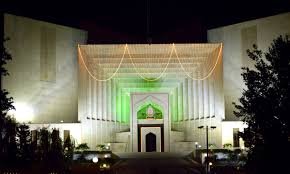
Supreme Court’s Ruling on Reserved Seats:
In a high-profile case concerning the reserved seats for women and minorities in the National Assembly and the provincial assemblies of Pakistan, the Supreme Court of Pakistan delivered its findings on July 12, 2024. A thirteen-member full bench, led by the Chief Justice Qazi Faez Isa, rendered a remarkable verdict in reserved seats case, titled as Sunni Ittehad Council versus Election Commission of Pakistan.
Overview of the Decision
Eight out of the thirteen judges issued the majority opinion, articulated in a short order by Justice Mansoor Ali Shah. Meanwhile, three justices, namely Justice Jamal Khan Mandokhel, Justice Yahya Afridi, and Justice Amin ud Din, provided dissenting notes. Justice Qazi Faez Isa concurred with Justice Mandokhel’s short order, and Justice Naeem Akhter agreed with Justice Amin ud Din’s short order. Consequently, the bench issued four distinct short orders, with two dismissing the appeals and two disposing of them under specified terms.
Majority Order
The majority order, authored by Justice Mansoor Ali Shah and supported by seven other judges (Justice Munib Akhtar, Justice Muhammad Ali Mazhar, Justice Ayesha A. Malik, Justice Athar Minallah, Justice Syed Hasan Azhar Rizvi, Justice Shahid Waheed, and Justice Irfan Saadat Khan), decided the appeals with the following key points:
Judgment and Order Overturned: The judgment of the Peshawar High Court dated March 25, 2024, and the Election Commission’s order dated March 1, 2024, were set aside.
Election Symbol Clarification: It was declared that the absence or denial of an election symbol does not infringe upon the constitutional and legal rights of a political party to participate in elections.
PTI Recognition: Pakistan Tehreek-e-Insaf (PTI) was affirmed as a political party within the meaning of Articles 51 and 106 of the Constitution, having won seats in the 2024 general elections.
Candidate Affiliation: Out of 80 returned candidates now serving as MNAs, 39 out of which had shown their affiliation with PTI in their nomination papers
as per the records presented by the election commission of Pakistan before the court. It is declared that, these 39 candidates have secured the seats of PTI. The remaining 41 candidates were given 15 days to submit a notarized statement of their political affiliation with PTI.Entitlement to Reserved Seats: PTI is entitled to reserved seats for women and minorities in the National Assembly.
Provincial Assemblies: The same rule for reserved seats applies to PTI in the provincial assemblies of Punjab, Khyber Pakhtunkhwa (KPK), and Sindh.
Dissenting Opinions:
Order by Justice Jamal Khan Mandokhel
Justice Jamal Khan Mandokhel, with concurrence from Justice Qazi Faez Isa, issued an order that disposed of the appeals in following terms:
Partial Upholding: The Peshawar High Court’s judgment and the Election Commission’s order were partially upheld.
Election Symbol Rights: It was affirmed that the lack of an election symbol does not affect a political party’s rights to participate in elections.
PTI Recognition: PTI was confirmed as a legitimate political party per Articles 51 and 106.
Candidate Classification: Candidates who declared their affiliation with PTI but were incorrectly classified as independent by the Election Commission were to be recognized as PTI candidates. Those who identified as independent or left the affiliation column blank were to be treated as independents.
Recalculation of Reserved Seats: The ECP was directed to recalculate and reallocate reserved seats among political parties, including PTI, as per Article 51(6)(d) and (e) of the Constitution.
Order by Justice Yahya Afridi
Justice Yahya Afridi dismissed the appeals with the following observations:
Political Party Compliance: Sunni Ittehad Council did not meet the criteria for a political party, whereas PTI did under the enabling provisions of the constitution.
Affiliation Acknowledgment: Candidates who declared their PTI affiliation on oath were to be considered PTI members unless they submitted a declaration to the ECP or returning officer indicating otherwise.
Post-election Affiliation Concerns: The issue of candidates nominated by PTI joining other parties after being elected raised serious concerns.
Legal Appropriateness: The issues raised above are not challenged in the present appeals, and the aggrieved individuals are not party to the appeals; thus, specific directions to the ECP are legally inappropriate.
ECP Direction: The ECP is instructed to allocate reserved seats for women and minorities in light of the above determinations after hearing the parties.
Order by Justice Amin ud Din
Justice Amin ud Din, with Justice Naeem Akhter’s agreement, dismissed the appeals without additional observations.
Conclusion
The appeals were decided as per the majority order authored by Justice Mansoor Ali Shah, recognizing the Pakistan Tehreek e Insaf as political party and entitled to the allocation of reserved seats for women and minorities in the National Assembly and the provincial assemblies, setting a significant precedent for future electoral and representation issues in Pakistan. This judgment underscores the judiciary’s pivotal role in upholding constitutional rights and ensuring a fair political process.
